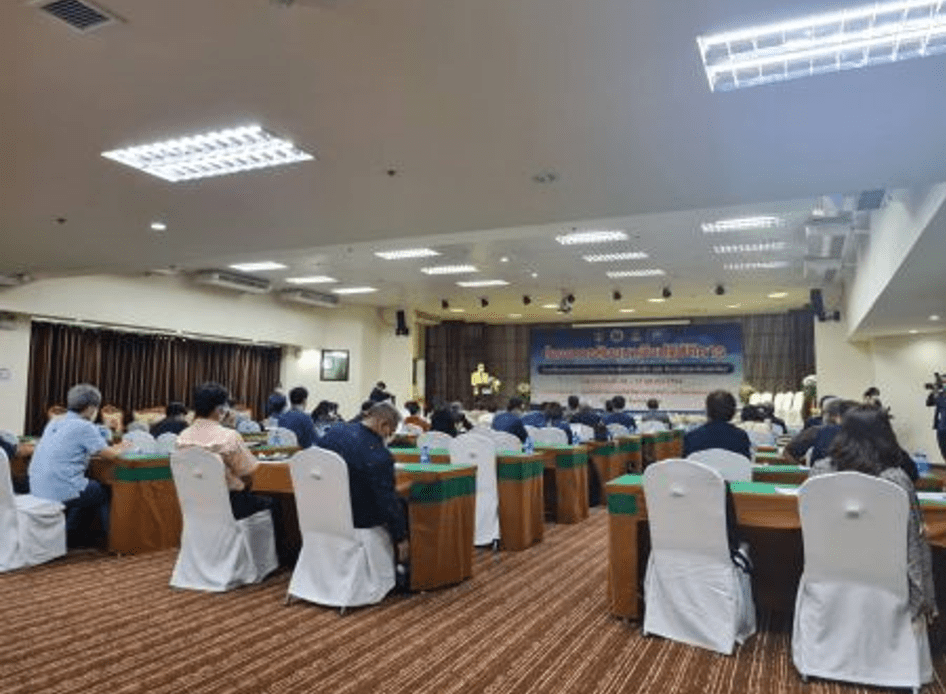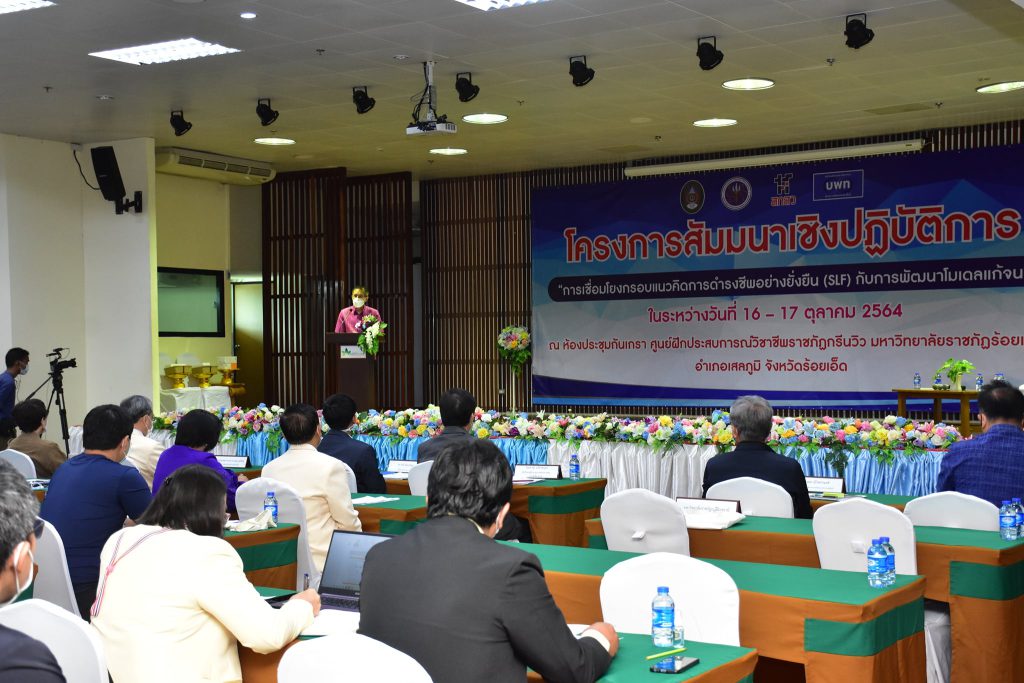
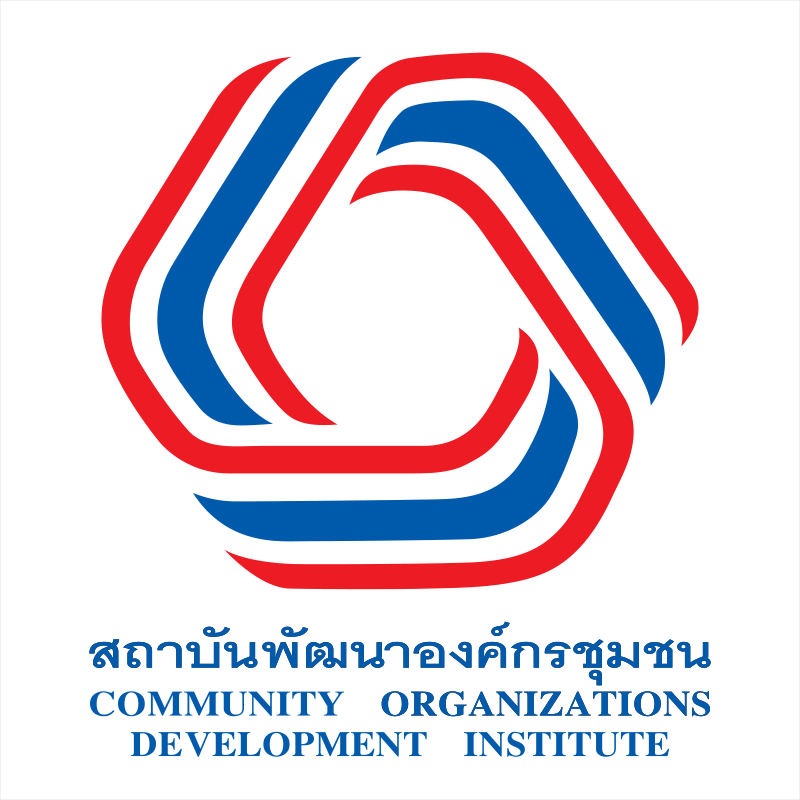
วันที่ 16-17 ตุลาคม 2564 หน่วยบริหารและจัดการทุนด้านการพัฒนาระดับพื้นที่ (บพท.) ร่วมกับ มหาวิทยาลัยราชภัฏร้อยเอ็ด จัดประชุมเชิงปฏิบัติการ การเชื่อมโยงกรอบแนวคิดการดำรงชีพอย่างยั่งยืน (The Sustainable Livelihoods Framework: SLF) กับการพัฒนาโมดลแก้จน ขึ้นภายใต้โครงการขยายผลการพัฒนาระบบสนับสนุนการทำงานเชิงพื้นที่เพื่อการแก้ไขปัญหาความยากจนแบบเบ็ดเสร็จและแม่นยำและภาคีพัฒนา ระหว่างวันที่ 16-17 ตุลาคม 2564 มีผู้เข้าร่วมกว่า 60 คน อาทิ ผู้ทรงคุณวุฒิ นักวิจัยจากส่วนกลาง นักวิชาการ จาก 5 จังหวัด (เลย บุรีรัมย์ นครราชศรีมา อุบลราชธานี และร้อยเอ็ด) ภาคีพัฒนา สำนักงานพัฒนาสังคมและความมั่นคงของมนุษย์จังหวัดร้อยเอ็ด สถาบันพัฒนาองค์กรชุมชน (พอช.) พัฒนาชุมชนจังหวัดร้อยเอ็ด(พช.) ฯลฯ ณ ห้องประชุมใหญ่ 1 (ห้องกันเกรา) ชั้น 3 ศูนย์ฝึกประสบการณ์วิชาชีพการโรงแรมราชภัฎร้อยเอ็ดกรีนวิว อำเภอเสลภูมิ จังหวัดร้อยเอ็ด โดยมีเป้าหมายเพื่อเสริมสร้างความเข้าใจเกี่ยวกับแนวคิดการดำรงชีพอย่างยั่งยืน (The Sustainable Livelihoods Framework: SLF) และพัฒนาออกแบบโมเดลแก้จน โดยการเชื่อมโยงกับระบบข้อมูล PPP Connext และการวิเคราะห์ทุนการดำรงชีพอย่างยั่งยืนและพัฒนากรอบการประเมินผลตอบแทนทางสังคมตามแนวทางการดำรงชีพอย่างยั่งยืน Social Return on Investment (SROI) โดยการมีส่วนร่วมจากทุกภาคส่วนได้รับเกียรติจากผู้ว่าราชการจังหวัดร้อยเอ็ดเป็นประธานเปิดงาน
ผู้ช่วยศาสตราจารย์ ดร.เฉลย ภูมิพันธุ์ อธิการบดีมหาวิทยาลัยราชภัฏจังหวัดร้อยเอ็ด บรรยายถึง “โครงการวิจัยและนวัตกรรมเพื่อการแก้ไขปัญหาความยากจนแบบเบ็ดเสร็จและแม่นยำ กับการพัฒนาบทบาทของสถาบันอุดมศึกษา”ว่า มหาวิทยาลัยราชภัฏทั่วประเทศ 38 แห่ง มีนโยบายให้มหาวิทยาลัยราชภัฏเป็นสถานอุดมศึกษาที่ร่วมพัฒนาท้องถิ่นที่นำไปสู่การพัฒนาประเทศให้มีความยั่งยืน และคาดหมายให้ลูกหลานคนในท้องถิ่นได้กลับมาทำงานที่ราชภัฏเพื่อร่วมพัฒนาท้องถิ่นด้วย แนวทางการทำงานและบทบาทของมหาวิทยาลัยราชภัฏกับการพัฒนาท้องถิ่น เรามองว่าทำอย่างไรให้พี่น้องประชาชนที่อยู่ในชุมชนท้องถิ่นอยู่ดีกินดี อยู่ได้ แม้กระทั่งในสภาวะที่ประชาชนได้รับความยากลำบาก เราก็พร้อมให้การช่วยเหลือในทุกด้าน เช่น ภาวะวิกฤติโควิด มหาวิทยาลัยราชภัฏร้อยเอ็ด ร่วมกับภาคี เปิดเป็น โรงพยาบาลสนาม โดยการสนับสนุนของสาธารณะสุขจังหวัด
ในช่วงที่ผ่านมาได้มีกำหนดหลักการทำงานร่วม 3 ประการ คือ 1) การสนองความต้องการ เราต้องมาศึกษาและดูว่าเขามีความต้องการที่จะได้รับความต้องการนั้นหรือไม่ และสิ่งที่ต้องการจริงๆ คืออะไร 2) ท้องถิ่นหรือประชาชนสามารถช่วยเหลือตนเองได้หรือไม่ 3) การมีส่วนร่วมของคนในท้องถิ่น ที่มีส่วนร่วมในการพัฒนาต่อได้เป็นอย่างไร “สิ่งสำคัญที่จะนำไปสู่การปฏิบัติจริงนั้น มีหลายปัจจัย ขอเรียกว่า KUSA ประกอบด้วย 1) องค์ความรู้และข้อมูลเชิงวิชาการ (K) ที่ต้องมองว่าประชาชนมีความรู้เพียงพอหรือไม่ หรือมีผู้รู้ ผู้มีภูมิปัญญา ที่จะต้องมานำวิเคราะห์และพัฒนาต่อ เรื่ององค์ความรู้ เป็นเรื่องสำคัญ ที่ต้องได้รับการถ่ายทอดและนำไปสู่การประยุกต์ 2) ความเข้าใจ/การวิเคราะห์ตนเอง(U) เพื่อให้เกิดความเข้าใจอันนำไปสู่การพัฒนาศักยภาพต่อ 3) การพัฒนาทักษะ(S) มีการส่งเสริมและสิ่งที่ช่วยพัฒนาการดำเนินงาน เพื่อให้เกิดการพัฒนาทักษะให้มากขึ้น 4) ทัศนคติที่ดี(A) ทั้งท้องถิ่นและสถาบันอุดมศึกษาเพื่อให้เกิดการร่วมมือและยอมรับ”
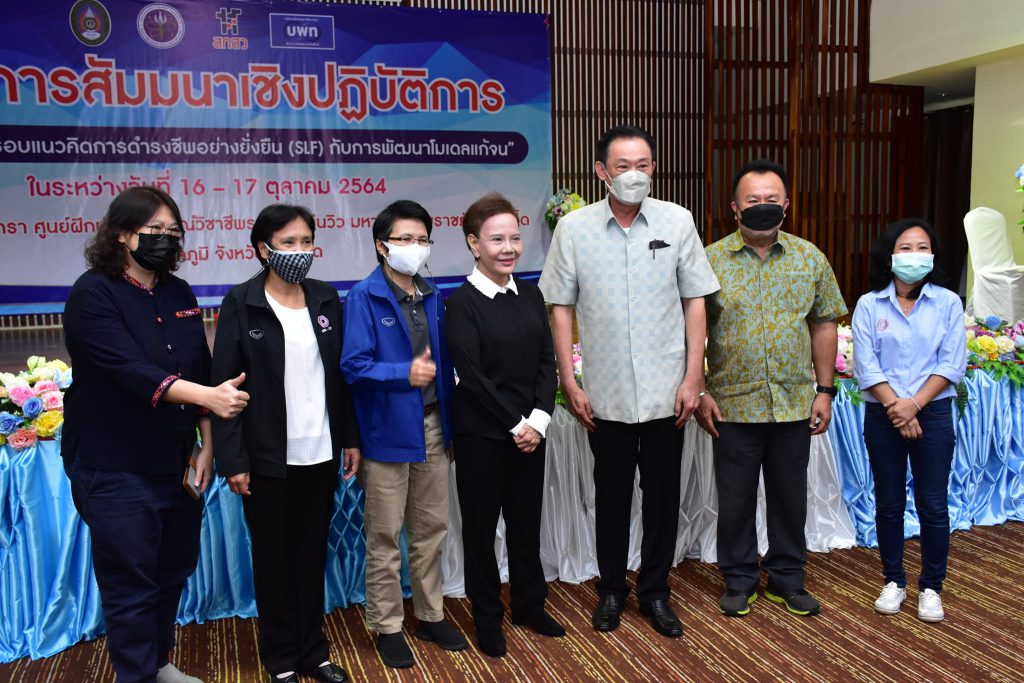
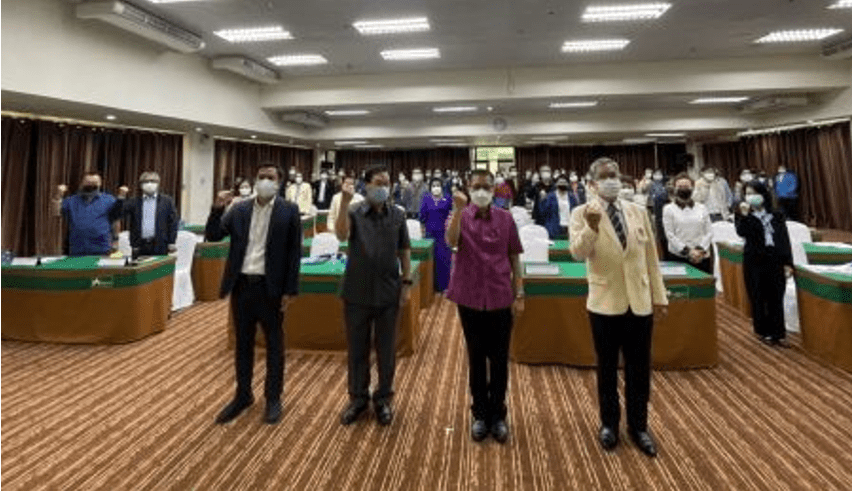
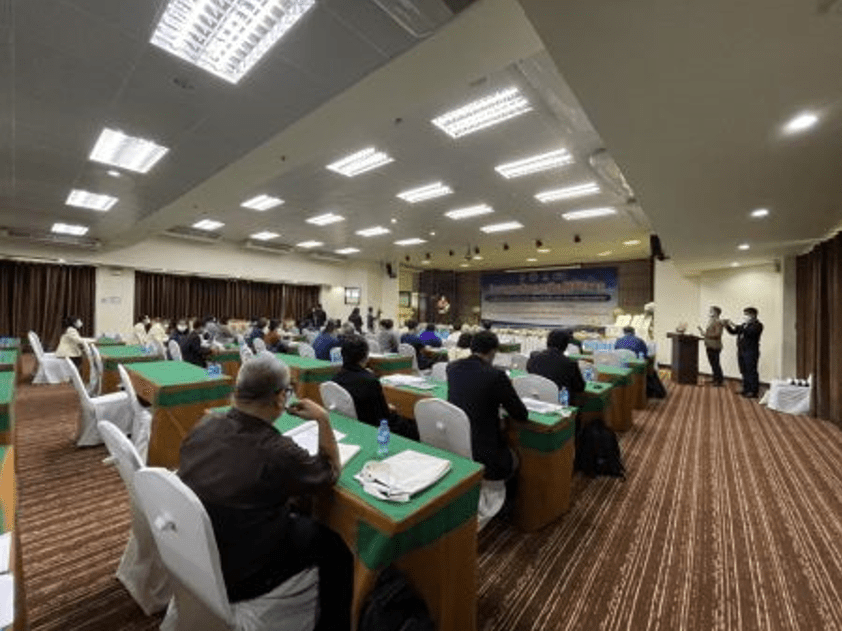
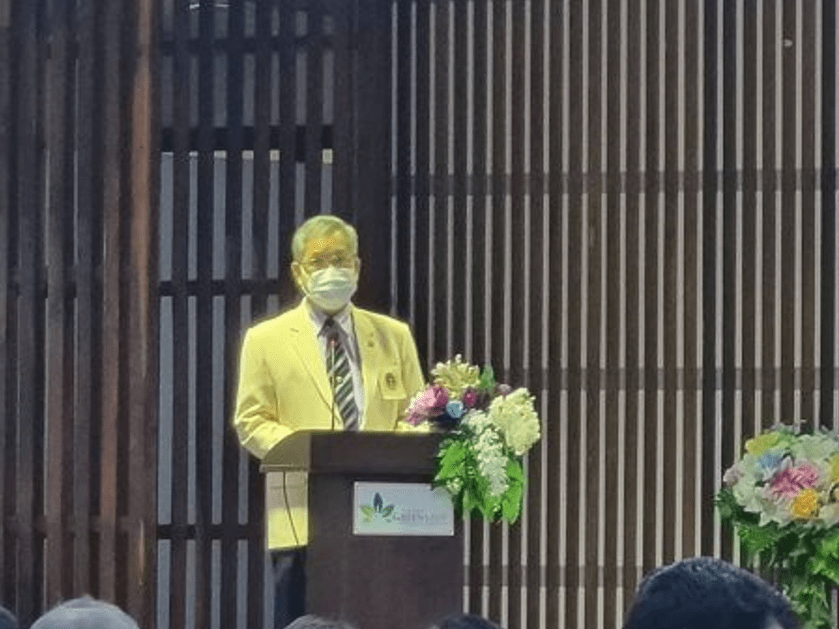
Area Development Capital Management and Capital Management Unit (TAMC) together with Roi Et Rajabhat University (RERU) organized a forum to link the concept of sustainable living with the development of poverty alleviation models
On October 16-17, 2021, the Area Development Fund Administration and Management Unit (TAMC) together with Roi Et Rajabhat University organize a workshop linking the Sustainable Livelihoods Framework (SLF) with the development of poverty alleviation models under the project to expand the results of the development of spatial support systems for comprehensive and accurate poverty alleviation and development partners The workshop was held between 16-17 October 2021, there were more than 60 participants, such as experts, researchers from the center, academics from 5 provinces (Loei, Buriram, Nakhon Ratchasima, Ubon Ratchathani and Roi Et), development partners, Office of Social Development and Human Security, Roi Et Province Community Organization Development Institute, Community Development, Roi Et Province, etc., at the Main Meeting Room 1 (Kan Krao Room), 3rd floor, Roi Et Rajabhat Hotel Training Center, Green View, Selaphum District, Roi Et Province. The goal is to enhance understanding of the Sustainable Livelihoods Framework (SLF) and develop a model to address poverty by linking with the PPP Connext data system and Sustainable Living Capital Analysis and developing a framework for assessing social returns based on the Sustainable Livelihoods Social Return on Investment (SROI) with participation from all sectors. It was honored by the governor of Roi Et as the chairman of the opening ceremony.
Assistant Professor Dr. Chaloey Pumipantu, Rector of Roi Et Rajabhat University, described “Research and Innovation Project for Comprehensive and Accurate Solution to Poverty Problems with the development of the role of higher education institutions 38 Rajabhat Universities across the country. They have a policy for Rajabhat University to be a higher education institution that contributes to local development leading to sustainable development of the country and expecting that the children of the local people will come back to work at the Rajabhat in order to join the local development as well. The working guidelines and roles of Rajabhat University and local development is to look at how to help people in the local community to live well, even in difficult conditions. We are ready to help in every aspect such as the Covid crisis. Roi Et Rajabhat University, together with the partners, opened a field hospital by the support of the provincial public health.
In the past, there have been three principles of working together: 1) Meeting the needs. We have to study and see if he has a need to meet that need or not and what is really needed. 2) How can the locality or the people help themselves? 3) The participation of the local people. How are they involved in further development? It is important to bring it into practice. There are many factors, let’s call it KUSA, which consists of 1) Knowledge and academic information (K) that must be considered whether people have sufficient knowledge or not, or have knowledge and wisdom to be analyzed and further developed knowledge It’s important 2) Self-Understanding/analysis (U) to create understanding that leads to further development of potential 3) Skills development (S) There is a promotion and things that help improve operations 4) Good Attitude (A) both local and higher education institutions to create cooperation and acceptance.
